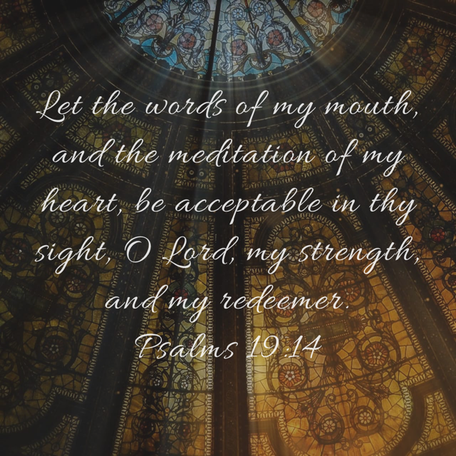|
Good morning!
Please join us in a hymn!
We share our joys and concerns with each other when we meet in Sunday School. Take a moment to be thankful for any blessings or joys you experienced this week, and to give any worries and concerns to God. If you have any would like to share, please feel free to comment below.
Our scripture lesson this week is Zephaniah 3:14-20.
Context
Zephaniah was a prophet in the southern kingdom of Judah in the seventh century BC. His lineage suggests that he may have been of royal blood (see Zephaniah 1:1). This family background would have given him deep insight into the state of the nation and impact his understanding of God as king of Israel. Zephaniah understood the importance of leadership and what its absence could do to a nation. Zephaniah likely wrote in the late 620's BC before King Josiah's spiritual reforms. The prophet is primarily concerned with Judah's continued rebellion against God (see 2 Kings 22:1-23:28). The first two chapters of the book of Zephaniah describe a coming Day of the Lord, in which Judah is to face judgment for idolatry. This judgment is to come in the form of both the natural consequences of that nation's choices and as a tool of God for purifying his people. God's process of purification would remove the rebellious in order to ensure the survival of those remaining faithful -- "the remnant of Israel" (Zephaniah 3:12; see also 2:7-9; compare Isaiah 10:20-22). The prophet's warnings to Judah carried weight given the fact of the deportation of the northern kingdom (Israel) by Assyria in 722 BC. That reality and its associated horror underlined the fact that Zephaniah's warning was not an idle threat. Zephaniah's prophecy of God's judgment came true in 586 BC. That was the year the Judeans were cast into Babylonian exile (2 Kings 25:1-21). The prophesied restoration would not begin until 538 BC, when Jewish captives were allowed to returned to Judah (Ezra 1:1-4). The ancient writers' fondness for using parallelism (structural doublets) is important to keep in mind when reading Old Testament passages composed as poetry. We should stress the significance of this technique: when the second phrase in lines of poetry echoes the first phrase, only one thing or action is in view, not two. One happy result of this fact is that when part of a verse is difficult to understand, its companion phrase may be used to interpret the more difficult portion. Zephaniah's prophecy presents us with a sharp change of theme beginning in Zephaniah 3:9, as restoration of a remnant takes center stage. The Lord promises that the, "meek and humble ... will trust in the name of the Lord," (Zephaniah 3:12), untroubled by those who are proud and haughty. The remnant can freely celebrate captivity's end.
Lesson
We normally discuss the lesson in person. Take a minute to reflect on each of the following questions, based on our passage for this week. If you are working through the lesson with someone else, discuss the questions together. You can share any thoughts or responses in the comments.
Conclusion
The final words of the book of Zephaniah remind us that restoration requires the power and willingness of God. He and he alone is the one who has the power to make restored relationship with him possible. That's why Zephaniah's promise of restoration for the Old Testament remnant is relevant to use yet today: it foreshadows our restored relationship to God through Christ. Christians have been delivered from the captivity of sin; yet we still live in a world that is mired in that captivity. Therefore the fullness of our deliverance is yet to come. We trust God to keep his promise in that regard because he has, among other things, "set his seal of ownership on us, and put his Spirit in our hearts as a deposit," (2 Corinthians 1:22). Although God's kingdom is not yet here in its fullest sense, his continuing work of restoration is guaranteed by the presence of his Spirit. Let us therefore celebrate these grand realities! As we do, we can affirm with Paul, "that neither death nor life, neither angels nor demons, neither the present nor the future, nor any powers, neither height nor depth, nor anything else in all creation, will be able to separate us from the love of God that is in Christ Jesus our Lord," (Romans 8:38-39).
Prayer
Lord, open our eyes to ways in which you are present and restoring your kingdom in and around us. In Jesus' name we pray. Amen.
3 Comments
Christine
5/3/2020 10:52:51 am
First, I would like to share a joy: I finished my student teaching this week!
Reply
Debbie Durila
5/3/2020 12:06:26 pm
Another great sermon.I love the story about the Good Shepherd and how it relates to our daily living.Knowing that the Lord is watching and protecting us through this pandemic gives me such comfort. Thank you Gary for your reassuring words.Thank you Amy for your beautiful gift of music.
Reply
Lisa
5/3/2020 02:06:28 pm
Congratulation Christine!
Reply
Leave a Reply. |
AuthorWe are a small, rural Presbyterian church in southwestern Pennsylvania. Archives
July 2024
Categories
All
|


 RSS Feed
RSS Feed